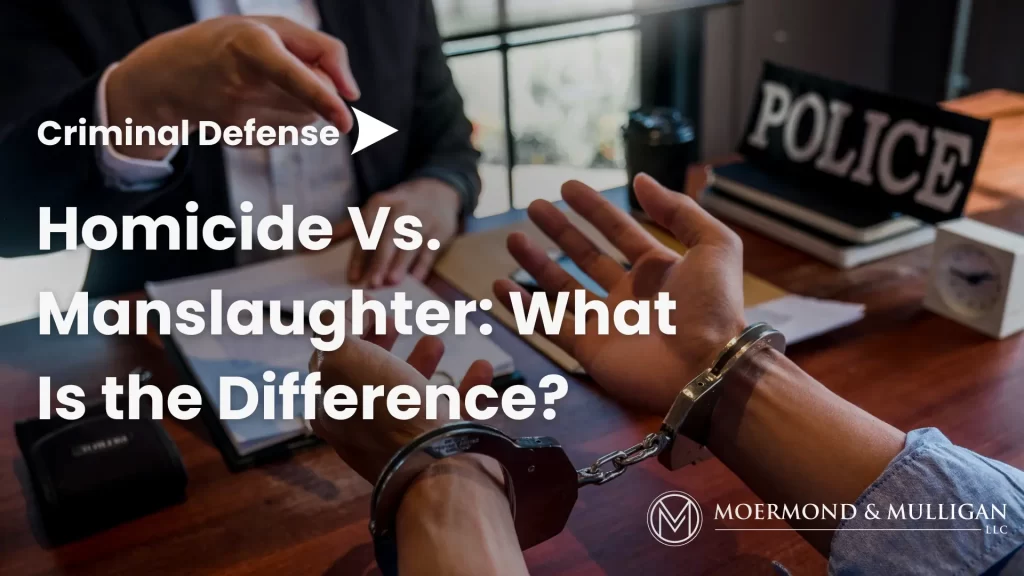Posted on Thursday, May 30th, 2024 at 2:45 pm

Homicide and manslaughter are similar terms, but they describe different things. Do you know the homicide vs manslaughter difference? If not, Moermond & Mulligan, LLC is here to explain what they mean, what penalties they involve, and how to mount a strong defense against either charge.
What is the Difference Between Manslaughter and Homicide?
What’s the difference between homicide vs manslaughter? In essence, the difference between manslaughter and homicide is the difference between squares and rectangles. While all acts of manslaughter are homicides, not all homicides are manslaughter. What does homicide mean in law? Homicide is simply the killing of another person. It is a broad term that encompasses both legally justified killings and illegal ones, like murder and manslaughter.
The terminology can cause some confusion, as the word “homicide” appears in various statutes related to manslaughter. This complicates understanding the distinctions between these categories. Specifically, Ohio statutes define these terms under the following sections: aggravated murder (ORC 2903.01), murder (ORC 2903.02), felony murder (part of ORC 2903.02), voluntary manslaughter (ORC 2903.03), and involuntary manslaughter (ORC 2903.04).
What Is Murder?
Murder is the crime of unlawfully killing another person. It can be classified further into aggravated murder, murder, and felony murder. Aggravated murder often involves premeditation or particularly heinous circumstances, while murder generally indicates intent to kill without the factors that elevate it to aggravated. Felony murder occurs when a death results during the commission of a felony, even if the death was unintentional.
What Is Manslaughter?
Manslaughter is the unlawful killing of a human being without malice. It is divided into voluntary and involuntary manslaughter. What is voluntary manslaughter in simple terms? Voluntary manslaughter usually happens in the “heat of passion,” where the perpetrator is provoked and loses control. Involuntary manslaughter occurs when a death is the unintended result of an irresponsible act or a low-level unlawful act.
Examples of Homicide and Manslaughter
What’s the difference between homicide and manslaughter? Ohio’s laws regarding homicide are found in Chapter 2903 of the state code. The penalties for homicide vs. murder vary based on the classification of the offense and specific circumstances surrounding each case. Here’s a breakdown of different examples of manslaughter and the penalties for each.
Unclassified Felonies
- Aggravated Murder (ORC 2903.01): Considered the most severe homicide offense, this can result from premeditation or specific aggravating circumstances. The penalty ranges from life imprisonment without parole to the death penalty.
- Murder (ORC 2903.02): This includes purposeful killing without the circumstances required for aggravated murder. Punishment is typically life in prison, with parole possible after 15 to 25 years.
1st Degree Felonies—Punishable by 3 to 11 years in prison
- Aggravated Vehicular Homicide under ORC 2903.06(A)(1)(a) involves causing a death while driving under the influence of drugs or alcohol.
- Aggravated Vehicular Homicide under ORC 2903.06(A)(2)(b) occurs when a repeat offender without a valid license causes a death while illegally driving.
- Voluntary Manslaughter under ORC 2903.03 involves killing in a sudden passion or fit of rage.
- Involuntary Manslaughter under ORC 2903.04 (“felony murder”) involves unintentionally causing death during the commission of a felony.
2nd Degree Felonies—Punishable by 2 to 8 years in prison
- Aggravated Vehicular Homicide under ORC 2903.06(A)(1)(b) involves causing death through reckless or aggressive driving, subject to severe penalties to discourage this kind of dangerous driving behavior in others.
3rd Degree Felonies—Punishable by 1 to 5 years in prison
- Reckless Homicide under ORC 2903.041 involves killing through reckless behavior.
- Involuntary Manslaughter under ORC 2903.04(A)(2) involves unintentionally causing a death while committing or attempting to commit a misdemeanor, carrying significant legal consequences.
4th Degree Felonies—Punishable by 6 to 18 months in prison
- Vehicular Homicide under ORC 2903.07(B) involves causing a death while operating a vehicle illegally.
1st Degree Misdemeanors—Punishable by up to 6 months in jail
- Negligent Homicide under ORC 2903.05 involves causing a death through negligent use of a deadly weapon, highlighting a grave lack of due care or caution.
- Vehicular Homicide under ORC 2903.07(A) occurs when a death results from negligent operation of a vehicle, often involving failure to follow traffic laws or rules of the road.
2nd Degree Misdemeanors—Punishable by up to 90 days in jail
- Vehicular Manslaughter (ORC 2903.08): Involves causing a death by a vehicle due to minor traffic violations, such as failing to stop at a stop sign.
Defending Yourself Against Homicide Charges
 Don’t know what charge is worse for your situation: homicide vs manslaughter? When facing homicide charges, it’s crucial to understand your rights and the immediate steps you should take to protect yourself. First and foremost, exercise your right to remain silent. Only talk to law enforcement when your lawyer is present. Anything you say to law enforcement can be used against you in court, and even seemingly harmless statements could significantly impact the rest of your life.
Don’t know what charge is worse for your situation: homicide vs manslaughter? When facing homicide charges, it’s crucial to understand your rights and the immediate steps you should take to protect yourself. First and foremost, exercise your right to remain silent. Only talk to law enforcement when your lawyer is present. Anything you say to law enforcement can be used against you in court, and even seemingly harmless statements could significantly impact the rest of your life.
Engaging an experienced local criminal defense attorney is an equally important step. A qualified attorney will thoroughly understand the law and have extensive experience handling similar cases.
What Can an Experienced Defense Attorney Do?
An experienced defense attorney can:
- Conduct a thorough investigation, which may include hiring private investigators, gathering forensic evidence, and interviewing witnesses.
- Develop a comprehensive defense strategy, which may involve self-defense, insanity defense, or proving an alibi, depending on the case specifics.
- Negotiate with the prosecutor to possibly reduce charges or secure a plea deal if it aligns with the client’s best interests.
- File pre-trial motions to suppress evidence that was illegally obtained or to dismiss charges when possible.
- Prepare for trial by organizing evidence, crafting opening statements and closing arguments, and planning the examination of witnesses.
- Participate in the selection of the jury, choosing members who are impartial and suitable for the specific case.
- Represent the client in court, presenting evidence, cross-examining witnesses, and arguing legal points before the judge and jury.
- If the client is convicted, evaluate the potential for an appeal based on possible legal errors during the trial that could have affected the verdict.
Your defense attorney’s goal is to protect your rights throughout the legal process and to work toward the best possible outcome, given the facts of your case. Remember, the right attorney can make a significant difference in resolving your charges.
Contact Our Elite Homicide and Manslaughter Defense Attorneys Today
Don’t know the difference between homicide vs manslaughter? What is the punishment for accidentally killing someone? If you’re facing homicide charges like murder or manslaughter, don’t navigate this challenging time alone. Exercise your rights and seek expert legal guidance. Call Moermond & Mulligan, LLC or contact us online for a confidential consultation to discuss your case and explore your defense options with our experienced attorneys.
Our Cincinnati criminal defense lawyers can use our decades-long experience and skills to get you the best outcome possible.
Related Posts:
Written By: Moermond & Mulligan, LLC
Last Updated: 02-11-2025